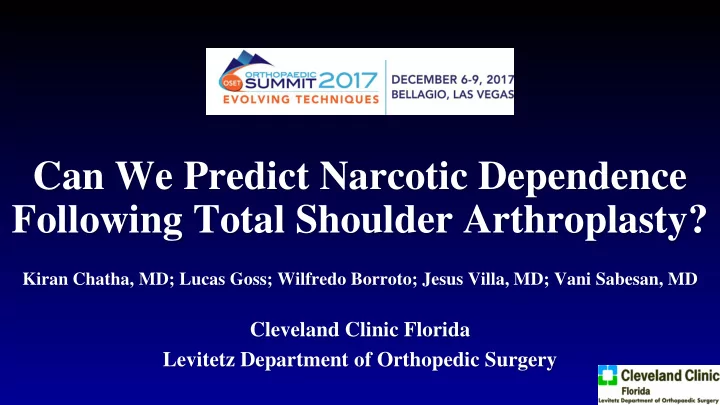

Can We Predict Narcotic Dependence Following Total Shoulder Arthroplasty? Kiran Chatha, MD; Lucas Goss; Wilfredo Borroto; Jesus Villa, MD; Vani Sabesan, MD Cleveland Clinic Florida Levitetz Department of Orthopedic Surgery
Introduction We Are Facing an Undeniable Narcotic Use Crisis in the US • The United States Consumes 85% of the World’s Oxycodone and 95% of the World’s Hydrocodone • In 2015 Alone: 15,000 Overdose Deaths from Narcotic Use • In 2014: Approx. 2,000,000 Americans were Dependent or Abusing Narcotics
Why Is This Important? Orthopedic Surgeons are the 3 rd Largest Prescribers of Narcotics As Surgeons We Need to Examine What Factors About Our Specific Patient Population We Can Influence
Arthritis Management Conservative Management of Arthritis by Primary Care is Usually with NSAIDs and Narcotics Specifically Chronic Shoulder Arthritis Patients Have High Rates of Narcotic Dependence Because of Chronic Use Leading Up To Surgery Theoretically, Relieving Arthritic Pain Through Surgery Should Result in Decreased Narcotic Use Postoperatively
Purpose To Determine Risk Factors for Postoperative Narcotic Dependence Among Shoulder Arthritis Patients Undergoing TSA
Methods Retrospective Case-control Study 747 TSA patients were included (2012-2015) • Preoperatively Dependent: Cases • Preoperatively Naïve: Controls All Recorded Prescriptions In Epic Were Examined and Correlated with the Automated State Databases
Definitions • Preoperative and Postoperative Dependence Was Defined As Continued Narcotic Use for 3 Months Surrounding Surgery • Preoperative and Postoperative Narcotic Use Was Defined As Recorded Narcotic Prescriptions For At Least 1 Month Prior to or After Surgery
Results – Preoperative Consumption • 747 Cases Included Preoperative Narcotic Exposure Status Non Dependent 295 223 Dependent 229 0 100 200 300 400 500 600 Exposed Naïve
Postoperative Consumption • Postoperatively Dependent: 32% (240/747) • 46% (341/747) Were Able to Wean off Narcotics by 30 Days • 53% (393/747) of Patients Received At Least 1 Refill • 69% from Orthopedic Surgeons • 36% (141/393) Received Refills For More Than 30 Days
Preoperatively Narcotic Naïve • 518 Patients Preoperatively Naive Narcotic Use at 1 Month Narcotic Dependence at 3 Months 26% 46% 54% 74% Narcotic Use Weaned off of Narcotics Narcotic Dependent Weaned off of Narcotics 12% Remained Narcotic Dependent at 6 Months after Surgery!
Preoperatively Narcotic Dependent • 229 Patients Preoperatively Dependent Narcotic Use at 1 Month Narcotic Dependence at 3 Months 27% 47% 53% 73% Narcotic Use Weaned off of Narcotics Narcotic Dependent Weaned off of Narcotics 22% were still On Narcotics At 6 Months Postoperatively!
Consumption Patterns in Postoperatively Dependent Patients • Amount Of Narcotics Prescribed Postoperatively: • Narcotic Naïve Preoperatively: 423 MMEs per script • Narcotic Dependent Preoperatively: 448 MMEs per script
Risk of Postoperative Dependence • Odds Ratio Calculations Showed a Statistically Significant 3.5 Times Risk of Narcotic Dependence Postoperatively if Patients Were Narcotic Dependent Preoperatively
Conclusions • The Vast Majority of Narcotic Naïve Patients Are Able To Wean Off By 90 Days Postoperatively • There was a 3.5 times risk of dependence at 90 days if you had preoperative narcotic dependence • Of The Patients Receiving Refills, 69% Were Receiving Refills From Their Orthopedist • As Surgeons, it is Important to be Aware of this Trend to Avoid Overprescribing and Creating Further Narcotic Dependence
So… Can We Predict Narcotic Dependence Following TSA? YES! It appears that preoperative dependence can predict narcotic dependence postoperatively
Thank you!
Recommend
More recommend